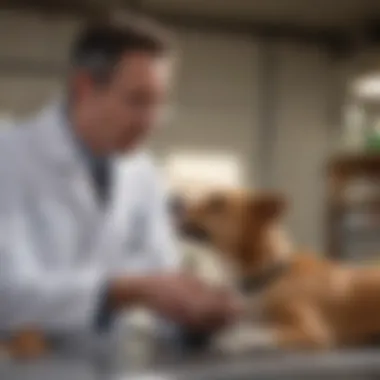Essential Nutrition for Dogs with Diarrhea Recovery


Intro
Diarrhea in dogs can be distressing for both the pet and the owner. Understanding the nutritional needs during this time is crucial for recovery. This guide will cover dietary strategies and feeding practices that can aid dogs in overcoming diarrhea. It also discusses why seeking veterinary help is essential before making any dietary changes.
Understanding Your Pet
Breed Traits
Different dog breeds may have varying susceptibilities to gastrointestinal issues. Some breeds, like the German Shepherd and Yorkshire Terrier, are more prone to digestive problems. Recognizing these traits can help dog owners be vigilant regarding their pet's health and diet.
Common Temperaments
The temperament of a dog can affect its eating habits. Dogs that are anxious may refuse to eat, while others might overeat in response to stress. Understanding your pet's behavior during diarrheal episodes is important for providing appropriate care.
Special Needs
Certain dogs, such as those with pre-existing health conditions or sensitive stomachs, require special attention to their diet. Consulting with a vet can help identify these needs and create a tailored nutrition plan.
Nutrition and Feeding Guidelines
When your dog experiences diarrhea, it is vital to adjust its diet accordingly. Here are some key considerations:
- Hydration: Ensure your dog has access to fresh water. Diarrhea can lead to dehydration, which is dangerous.
- Bland diet: Introduce easily digestible foods like boiled chicken and rice. These foods help bind the stool and reduce irritation in the gut.
- Avoid dairy and fatty foods: Lactose can be difficult for dogs to digest, especially when they're already unwell.
Feeding smaller portions three to four times a day can also ease your dog's digestion and recovery.
Phased Return to Regular Diet
Once the diarrhea subsides, gradually reintroducing your dog's regular food is essential. Start with small portions. Observe your pet's reaction before increasing the quantity. This will help ensure your dog can tolerate its usual diet without causing further gastrointestinal upset.
It’s essential to consult with your veterinarian before making any changes to your dog's diet.
Veterinary Consultation
Always seek veterinary advice when your dog has diarrhea lasting more than 24 hours. Chronic diarrhea can lead to further health issues like infections or intestinal parasites. A vet can diagnose the underlying cause and suggest specific foods or medications to aid recovery.
Culmination
Understanding the nutritional needs of dogs during episodes of diarrhea is critical. Through proper hydration, a bland diet, and a phased return to regular food, pet owners can help their furry friends recover. Consultation with a veterinarian is crucial for creating a comprehensive and effective recovery plan.
Understanding Canine Diarrhea
Understanding the nature of canine diarrhea is essential for proper management and care of dogs facing this uncomfortable condition. Diarrhea can signify a variety of underlying issues, which makes it necessary to comprehend its definition and common causes. Awareness in these areas aids pet owners in making informed decisions regarding their dog’s health.
Definition of Diarrhea in Dogs
Diarrhea in dogs is characterized by an increase in the frequency, volume, and fluidity of the stool. It happens when there’s a disruption in the digestion and absorption processes in the gastrointestinal tract. Understanding this definition lays the groundwork for recognizing symptoms and seeking appropriate interventions. It is crucial to differentiate diarrhea from loose stools, as the latter may not indicate a significant health issue.
Common Causes of Diarrhea
Diarrhea can have multiple origins. Identifying its cause is vital for treatment and recovery. Below are some of the most common causes:
Dietary Indiscretion
Dietary indiscretion refers to a dog's tendency to eat things that are not appropriate or healthy, such as spoiled food or foreign objects. This behavior often leads to gastrointestinal upset, resulting in diarrhea. One key characteristic of dietary indiscretion is that it is often avoidable. Proper diet management can significantly minimize incidents. However, the unique feature of this cause is that it may not always lead to long-term health issues if addressed promptly.
Bacterial Infections


Bacterial infections can also cause diarrhea in dogs. Various bacteria, like Escherichia coli and Salmonella, can disrupt the digestive system. A significant aspect of bacterial infections is their contagious nature, potentially affecting multiple pets in a household. The unique feature here is that symptoms can escalate quickly, requiring immediate veterinary intervention. This urgency positions bacterial infections as a crucial topic in discussions about canine diarrhea.
Viral Infections
Viral infections, such as parvovirus or distemper, represent another serious cause of diarrhea in dogs. These viruses can severely impact a dog’s immune system and overall health. One key characteristic of viral infections is their ability to spread rapidly, especially in unvaccinated dogs. The unique advantage of recognizing viral infections is the potential for preventive measures through vaccination, making it a vital aspect of this topic.
Parasites
Parasites like Giardia and roundworms can contribute significantly to diarrhea in dogs. The presence of these organisms usually results in inflammation and irritation in the intestines. One key characteristic of parasitic infections is that they can often be treated effectively with medications. However, the unique disadvantage is that even after treatment, reinfection can occur without proper preventative measures. This characteristic underscores the importance of understanding parasites in relation to diarrhea.
Underlying Health Issues
Underlying health issues, including conditions such as pancreatitis or inflammatory bowel disease, can also result in diarrhea. These issues often require a comprehensive diagnosis, as they may have complex causes. A critical aspect of underlying health issues is the need for ongoing veterinary care and monitoring. Recognizing this area is beneficial, as it emphasizes a proactive approach to diagnose and treat chronic conditions that lead to diarrhea.
Understanding the various causes of diarrhea allows pet owners to take immediate and informed actions, ensuring the well-being of their dogs.
Initial Response to Diarrhea
Understanding the initial response to diarrhea in dogs is crucial. Early actions can significantly affect the recovery process. Immediate dietary adjustments and timely medical consultations can prevent further health complications. Knowing when to seek veterinary care is essential to ensure your dog's well-being.
When to Consult a Veterinarian
Duration of Symptoms
The duration of diarrhea in dogs is an important aspect to consider. If symptoms persist beyond 24 hours, it is advisable to defer veterinary intervention. Prolonged diarrhea can lead to severe dehydration and electrolyte imbalances, making it imperative to seek professional guidance. The key characteristic of duration is that it reflects the overall health status of the dog. Rapid diagnosis may help address underlying causes effectively, making early veterinary consultation a beneficial choice.
Presence of Blood
Detection of blood in a dog's stool is another critical indicator. It often signifies a more serious condition like intestinal bleeding or serious infections. Presence of blood is a red flag. Owners should take this seriously and seek veterinary attention immediately. The unique feature of noticing blood is its potential link to severe health issues. Ignoring this symptom can worsen the situation and prolong treatment.
Other Concerning Symptoms
In addition to the noticeable signs, other symptoms such as vomiting, lethargy, or fever should prompt a veterinary consultation. These symptoms can indicate additional health problems that may complicate the underlying diarrhea issue. Recognizing these signs early can be beneficial and may prevent complications. The unique advantage of being attentive to these symptoms lies in the ability to address multifaceted issues more swiftly.
Immediate Dietary Adjustments
When dealing with canine diarrhea, immediate dietary adjustments are key. Initially, withholding food for 12-24 hours can give the dog's digestive system a necessary break. This fasting period allows the gastrointestinal tract to recover. After the fasting, slowly reintroducing easily digestible food like boiled chicken and plain rice can be effective. This approach minimizes further irritation to the gut and aids in recovery. Monitoring the dog's response during this time is essential.
Feeding Guidelines for Diarrheal Dogs
Feeding a dog with diarrhea requires special attention to what they eat. Proper nutrition can support recovery and help restore normal gut function. Hydration is a critical element in this process, as diarrhea can lead to rapid fluid loss, making it vital to address water intake first. Furthermore, the type of food offered should be gentle on the digestive system. Thus, understanding various dietary choices is essential for aiding recovery.
The Importance of Hydration
Signs of Dehydration
Dogs with diarrhea can become dehydrated quickly. Recognizing the signs of dehydration is important. Key characteristics include a dry nose, lethargy, and decreased skin elasticity. Noticing these symptoms can prompt immediate action, as hydration is crucial for maintaining overall health.
Dehydration can worsen gastrointestinal issues and lead to more severe problems if not addressed.
Methods to Encourage Water Intake
Encouraging a dog to drink water during diarrhea is essential for maintaining hydration. A favorite method is to offer fresh, clean water frequently. Using a pet water fountain can entice some dogs to drink more due to moving water. Additionally, consider providing low-sodium broth or ice cubes made from broth, as many dogs find these options appealing.
Recommended Food Types
Low-Fiber Dog Foods
Low-fiber dog foods help to reduce the amount of work the digestive system has to do. This type of food can promote quicker recovery from diarrhea. A key characteristic of low-fiber options is they provide easily digestible nutrients. Additionally, they often contain lower levels of ingredients that could irritate an upset stomach, making them a suitable choice in this situation.


Digestible Carbohydrates
Introducing digestible carbohydrates into a dog's diet can aid recovery from diarrhea. Rice and potatoes are common examples. They provide energy without overloading the gastrointestinal tract. The unique feature of easily digestible carbohydrates is their swift breakdown for absorption. This can be beneficial since it helps prevent further digestive stress.
Lean Proteins
Lean proteins are essential in a recovery diet. Chicken, turkey, or fish provide high-quality protein needed for healing. The key characteristic of lean proteins is that they are less likely to cause an upset stomach. This food choice is beneficial, as it offers the necessary nutrients without increasing the digestive burden on an ill dog.
Homemade Diet Options
Chicken and Rice Recipe
A common homemade option for dogs experiencing diarrhea is a chicken and rice recipe. This dish is simple to prepare and contains easily digestible ingredients. The softness of the rice combined with boiled chicken helps soothe the stomach. This meal is popular due to its basic ingredients and its efficacy in helping dogs return to normal eating patterns.
Pumpkin as a Nutritional Aid
Pumpkin serves as a helpful nutritional aid for dogs with diarrhea. It is rich in fiber, which can help firm up stool. Pumpkin can also provide hydration if added to food. Its high water content is a unique feature that makes it a valuable addition to the diet during recovery. However, it is vital to use plain canned pumpkin without additives.
Commercial Products for Dogs with Diarrhea
Understanding the role of commercial products in managing diarrhea in dogs is essential. These products serve as effective tools to support recovery and to ensure your dog's nutritional needs are met during this distressing time. Commercial solutions come in many forms, including specialized diets, over-the-counter supplements, and hydration solutions. Each type has its merits, and knowing when and how to use them could significantly impact your pet’s health.
Veterinary Prescription Diets
Veterinary prescription diets are specifically formulated to address gastrointestinal problems. These diets often feature highly digestible ingredients that ease the digestive process, reducing the workload on the intestines. They tend to be low in fat and fiber, which can help alleviate diarrhea. Vets often recommend these diets when a dog is experiencing more severe or prolonged gastrointestinal issues.
The availability of different flavors and formulations makes it easier for pet owners to find an option that appeals to their dog's taste. Consulting your veterinarian before making this choice is crucial. They can guide you in selecting the right product based on your dog's specific health condition. The drawback might include a higher cost compared to regular dog food, but the benefits often outweigh the expenses when it comes to your pet's health.
Over-The-Counter Solutions
Over-the-counter solutions offer a more accessible way to manage mild diarrhea in dogs. They include probiotics and electrolyte solutions, both of which can help promote recovery and maintain hydration levels.
Probiotics
Probiotics play a key role in restoring the natural balance of gut bacteria. This balance can be disrupted during episodes of diarrhea. By adding probiotics to your dog’s diet, you can help stimulate healthy digestion. The unique feature of probiotics is their ability to contribute to overall gut health, which is crucial for recovery.
One of the key benefits of probiotics is their ease of use. They come in various forms, including powders and chews, making them simple to incorporate into your dog’s daily routine. The downside could be that not all probiotic products are created equal. It’s important to choose those specifically designed for dogs, as human products might not deliver the same effectiveness.
Electrolyte Solutions
Electrolyte solutions serve an important function for dogs experiencing diarrhea. They help replenish lost fluids and essential minerals. Diarrhea can lead to significant dehydration, making it vital to restore fluid balance as quickly as possible. Using electrolyte solutions specifically designed for pets is beneficial in these situations.
The key characteristic of these solutions is their ability to quickly hydrate. They typically contain sodium, potassium, and glucose, which are vital for maintaining hydration levels. However, it’s crucial to use them appropriately. Overuse can lead to imbalances and possibly worsen the situation. Consulting a vet about the proper dosage is always a good idea.
Reintroducing Regular Food
Reintroducing regular food to a dog recovering from diarrhea is an important step that requires careful attention. The transition back to a normal diet can significantly influence the dog's recovery process and overall health. It is vital to ensure that the food is not only suitable but also enjoyable for the dog. A smooth transition helps prevent a relapse into diarrhea, ensuring a stable and healthy digestive system.
This phase should involve small amounts of regular food while monitoring the dog's response. Gradual reintroduction minimizes digestive stress and helps the dog adjust. It allows the gut to rebuild its tolerance to regular nutrients. Additionally, choosing the right type of food during this period is essential to avoid overwhelming the digestive system.
Gradual Transition Protocol
The gradual transition protocol involves slowly mixing small amounts of regular food with the dog's current diet. Start with a 25% ratio of the normal food to 75% of the bland diet. Each day, you can increase the regular food by about 25%. This method helps the dog adapt to the change. It also allows the owner to identify any adverse reactions that may arise due to the transition.
By the end of the week, if the dog is responding well, it should be consuming its normal diet wholly. However, if any symptoms reappear, reduce the amount of regular food and give the dog some time before trying again.
Monitoring Reactions


Monitoring the dog's digestive health during the reintroduction of regular food is crucial. Observing how the dog reacts to the new diet can provide insights into its health status. Some key behaviors and symptoms should be closely watched.
Signs of Digestive Distress
Signs of digestive distress may include vomiting, bloating, or discomfort. These reactions can signal that the dog's system is struggling to adjust to the returned diet. Identifying these signs early can be very beneficial in managing the dog's health.
A key characteristic of the signs of digestive distress is an abrupt change in the dog’s behavior, especially around meal times. This can occur when a dog refuses to eat, appears agitated, or shows signs of pain after eating. Recognizing these symptoms is essential for a responsible pet owner. It not only allows for timely reactions but also promotes overall well-being for the pet.
Adjusting Feeding Strategy
Adjusting the feeding strategy is necessary if signs of distress manifest. A flexible approach enables pet owners to discern what works best for their dog at any given time. The key characteristic of this strategy is its adaptability; understanding that not all dogs will respond the same way to their food is crucial.
A unique feature of this approach is the emphasis on the dog's specific needs. Customizing meals means that an owner can switch back to bland foods if needed or adjust portion sizes. This consideration supports the overall goal of ensuring the dog maintains its health while recovering from diarrhea. It also prevents future episodes by finding a suitable long-term feeding strategy that aligns with the dog's digestive tolerance.
Long-Term Dietary Considerations
Long-term dietary considerations for dogs experiencing diarrhea are crucial for their overall health and well-being. Addressing these aspects goes beyond the immediate dietary adjustments during episodes of diarrhea. It involves understanding your dog's unique nutritional needs, identifying food allergies, and maintaining a balanced diet.
Identifying Food Allergies
Food allergies can significantly impact a dog's gastrointestinal health. When a dog is allergic to certain ingredients, it may experience diarrhea and other symptoms. Common allergens include beef, chicken, dairy, and wheat.
To identify food allergies:
- Elimination Diets: Remove potential allergens from your dog's diet for a period, then slowly reintroduce them one at a time.
- Monitoring Symptoms: Keep an eye on any changes in stool consistency or behavior after reintroducing specific foods.
- Veterinarian Consultation: A vet can provide guidance on structured elimination diets and may suggest hypoallergenic dog foods.
Recognizing food allergies can lead to more effective long-term management. Avoiding allergens helps prevent gastrointestinal distress and promotes a healthier gut.
Maintaining a Balanced Diet
Maintaining a balanced diet is essential in ensuring your dog receives all necessary nutrients. A well-rounded diet supports recovery from diarrhea and strengthens the immune system. Key considerations include:
Macronutrient Distribution
Macronutrient distribution refers to the ratio of carbohydrates, proteins, and fats in a dog's diet. Each macronutrient plays a role in overall health:
- Proteins: Essential for tissue repair and muscle maintenance. Lean meats are preferred choices.
- Carbohydrates: Provide energy. Easily digestible carbs such as rice can help minimize gastrointestinal issues.
- Fats: Support skin health and absorption of vitamins. Healthy fats should be included in moderation.
The balance of these macronutrients will help meet your dog's specific needs. A well-distributed diet can also help prevent future digestive issues, making it a beneficial choice for dogs recovering from diarrhea.
Importance of Fiber
Fiber plays a unique role in digestive health. High-quality sources of fiber can help regulate bowel movements. This is important for dogs that may have experienced diarrhea.
- Types of Fiber: Soluble and insoluble fibers both play vital roles. Soluble fiber can help soak up excess moisture in the intestine, while insoluble fiber adds bulk to stool.
- Promoting Digestive Health: Fiber also supports healthy bacteria in the gut, which is crucial after episodes of diarrhea.
- Balancing Intake: It’s essential to find the right amount of fiber. Too much can exacerbate diarrhea, while too little can lead to constipation.
Introducing fiber gradually can help ensure dogs adjust without discomfort. A proper amount of fiber helps maintain regular digestion, making it an important aspect of dietary management.
By focusing on long-term dietary considerations, pet owners can enhance their dog's recovery and promote ongoing gut health. Proper nutrition is not just about recovery; it is vital for overall health.
End
Key elements to consider include:
- The importance of hydration, as dehydration can quickly emerge in dogs with diarrhea.
- Identifying suitable food types, focusing on easy-to-digest meals, which minimize strain on the digestive system.
- The necessity of reintroducing regular food gradually, observing any adverse reactions during the transition.
Veterinary consultation is essential for guiding these dietary adjustments, particularly when addressing underlying health issues. This professional guidance offers tailored insights and recommendations specific to each dog’s needs.
"A dog’s digestive health is pivotal to their overall well-being. Proper nutrition during gastrointestinal distress can make a difference in recovery time."
Benefits of thorough dietary management include:
- Reducing the duration and intensity of diarrhea.
- Supporting the dog's immune system through proper nutrition.
- Preventing future digestive issues by identifying potential food allergies or sensitivities.
Ultimately, combining a solid understanding of canine dietary needs with close monitoring can empower pet owners to manage diarrhea effectively. This not only enhances the well-being of their pets but also fosters a deeper bond through attentive care.



